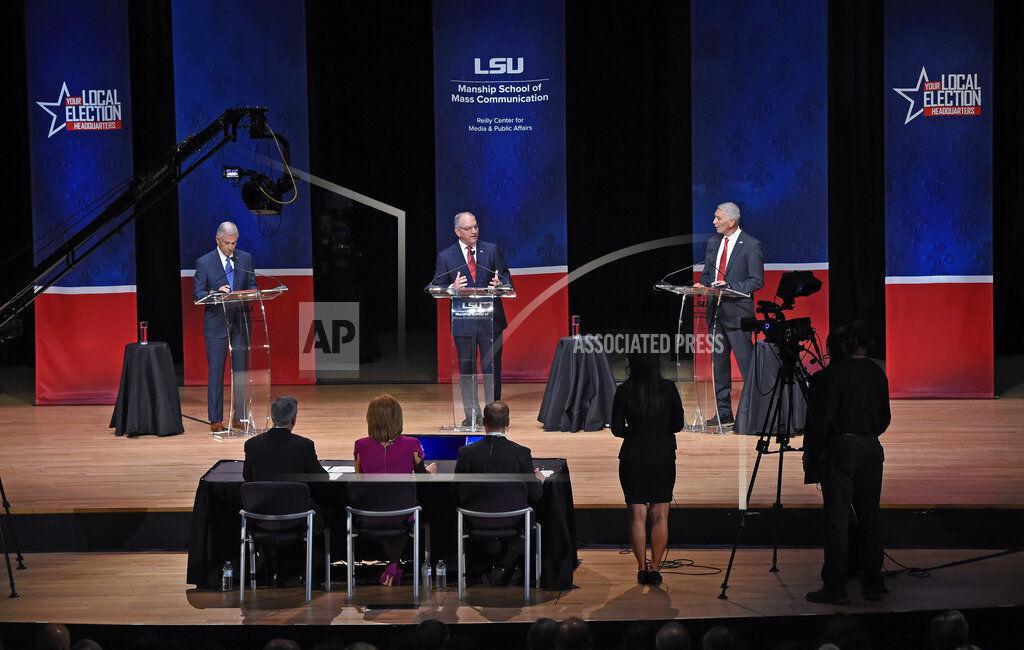With the Louisiana primary election tomorrow, here’s a review of the three gubernatorial debates, with main candidates Democrat Gov. John Bel Edwards running for reelection against Republican opponents Rep. Ralph Abraham and businessman Eddie Rispone.
First gubernatorial debate, held Sept. 19 at 7 p.m. at the LSU Student Union Theater
The first question of the evening was about the recent rise in vaping-related illnesses and whether candidates would consider banning flavored e-cigarettes.
Rispone said he was not prepared to sign an executive order banning e-cigarette products, but said Louisiana should place warnings on e-cigarette products and look into reducing residents’ use of them. Edwards said he said he supported President Trump’s decision to ban flavored e-cigarettes. Abraham said as a physician, he believes e-cigarettes are highly unhealthy for anyone to use and must be regulated.
All candidates supported TOPS, opposed abortion law exceptions in the case of rape or incest and supported second amendment rights.
Abraham has missed 44% of votes in Congress since the start of his third term, the highest percentage of any sitting representative in the nation. He was asked why he did not step aside in Congress to focus on this race.
Abraham said he “represents our constituents every day” and is in constant contact with his staff on Capitol Hill, who are “solving problems every day of the week.”
Rispone was asked about his contribution of nearly $1 million to federal campaigns since 1996 and if these donations affect his definition of himself as a non-career politician. He said they do not.
“The only reason I’m running– it’s not an ego trip – it’s to make this state great again,” Rispone said.
When asked if they would support legislation to raise the state’s gas tax to cut down on the infrastructure backlog, Rispone said his administration would improve roads and bridges instead of allocating those funds to other projects. Edwards said it was unrealistic to expect the $14 billion infrastructure backlog to be solved quickly but that it is improving.
Second gubernatorial debate, held Sept. 26 at 7 p.m. at the University of Louisiana at Lafayette
The first question of the second debate centered around the candidates’ stances on a constitutional convention, which only Rispone was in favor of.
“If you open that boy (Louisiana constitution) up, you better be careful,” Abraham said. “Things like protecting the unborn can be on the chopping block.”
Both Rispone and Abraham said a reform of the Louisiana Department of Transportation is needed. Edwards acknowledged that there are changes to be made, but mentioned his recent $700 million investment in infrastructure, among other projects.
All three candidates said early education should be a top priority.
Rispone was asked to clarify previous statements about the impact of sanctuary cities and undocumented workers in Louisiana. Rispone said he views New Orleans as a sanctuary city because the city previously funded a protest against ICE, and he supports President Trump’s efforts to “build the wall” and eradicate sanctuary cities and gangs.
Edwards was asked why Louisiana residents should vote for him for a second term when Louisiana still ranks among the lowest in many categories, including poverty, in the nation. Edwards said Louisiana is doing much better “in just about every measure” under his leadership and now has the tenth fastest growing economy in the nation.
Because of his experience as a physician, Abraham was asked about the opioid crisis and the role that doctors and pharmacies play in the epidemic. Abraham said he took the responsibility of monitoring patients for possible opioid abuse very seriously.
Candidates were asked about their stances on eliminating or reforming the death penalty. Abraham and Edwards both supported the death penalty, with Rispone against it for religious reasons.
All three were in favor of allowing the state’s legislature to control redistricting and against rolling back Medicaid expansions. Rispone and Abraham opposed universal background checks for gun sales, but Edwards said he favored background checks for commercial sales. Edwards was the only candidate in favor of an increase in minimum wage.
When asked if climate change is caused by human activity, Abraham said he didn’t believe he could answer with a “yes” or “no.” When pressed, he responded “no,” along with Rispone. Edwards quickly replied with a “yes.”
Third gubernatorial debate, held Oct. 9 at 7 p.m. in Shreveport
Candidates were asked about issues like Medicaid, education reform and diversifying the economy.
In the candidate’s individual questions, Rispone was asked if there was anything about President Trump’s behavior he disagreed with on a moral basis.
“I don’t judge other people. It’s not up to me to judge someone’s moral character,” Rispone said. “I’m a supporter of Trump and will continue to be a supporter of Trump.”
Edwards was asked about his former staff member, Johnny Anderson , who was fired on sexual assault allegations and why he hired him. Edwards reiterated Anderson was discharged within hours of learning of the allegations against him.
Abraham was asked if he is unhappy President Trump hasn’t endorsed him outright for governor over Rispone, the other top Republican candidate. Abraham said he wasn’t upset because Trump simply wants a Republican governor in Louisiana again.
When asked about the extra sales tax given the surplus this year, Rispone and Abrahaham said they were against it.
Edwards said that the state has been “plagued by deficits for nine straight years,” and that while they would change the sales tax, it would be by looking forward, instead of dwelling on past surpluses.
Another question centered around would candidates’ responses would be to a woman whose pregnancy was a result of rape and incest. All three candidates said they would pray for the woman, but wouldn’t back down from their pro-life stance. All three candidates said they would do their best to lower auto insurance rates.
Only Edwards agreed that Louisiana should do more to help people with affordable housing. Both Rispone and Abraham said these people should receive help with getting jobs instead.





